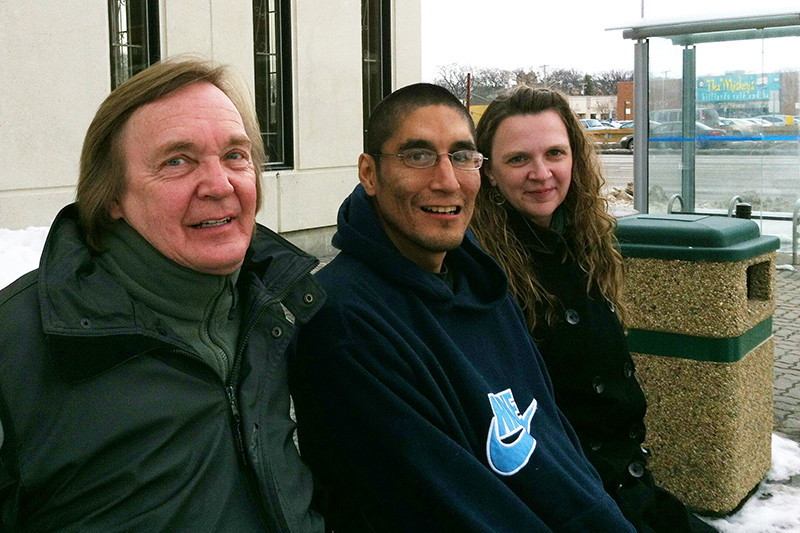‘Welcomed with open arms’
Local FASD outreach program helps clients face challenges one day at a time
As someone who lives with Fetal Alcohol Spectrum Disorder (FASD), Russ Hilsher sees the world differently than most.
“Somebody asked me once if I could describe to them what my brain was like,” says Hilsher, 35. “I told them it’s kind of like there’s a storm up in my head - everything is jumbled around and foggy, and I can’t connect the dots.
“Some days, everything is all over the place. There’s no clarity.”
FASD is an umbrella term which is used to describe the range of disabilities caused by prenatal exposure to alcohol.
Fortunately for Hilsher and a handful of others in the city who share his struggle, there’s always a lighthouse on the horizon.
Since launching in 2003, the non-profit Touchstone FASD Program has been helping youth and adults with FASD face their challenges one day at a time.
Funded by the provincial government, Touchstone operates under the umbrella of Initiatives for Just Communities in Winnipeg’s West End.
Touchstone serves 18 clients and aims to provide support and assistance to individuals with FASD while promoting public awareness of the disorder.
Hilsher has been involved with Touchstone since 2004, and spends six hours per day, seven days a week with outreach workers from the program.
Adopted at a young age, Hilsher ran into countless difficulties growing up, whether it was in school or with the law.
His vicious circle of hyper-impulsivity and substance abuse has been a life-long challenge, and has earned him time in various correctional institutions in the past.
Today, he still struggles with alcohol and other substance abuse, sometimes leading to further entanglements with the judicial system.
Hilsher is making an active effort to overcome these problems, though the process is a daily struggle.
“A lot of the time (people with FASD) can’t properly see the pros and cons of different decisions,” he explains. “Getting caught up in the moment, it can be hard to say ‘No’ to things since impulsivity plays such a big part in it.”
Harri Vallittu, a Touchstone outreach worker, says sympathy for a client’s difficulty perceiving long-term consequences is a fundamental aspect of the organization’s philosophy.
“We don’t endorse the bad behaviour, but we’re there to help them through it,” says Vallitu, who has worked with Hilsher in various capacities for over a decade.
Program workers assist their clients with everything from running errands, buying groceries and budgeting finances, to attending probation meetings and court dates.
During sessions, the pairs also participate in activities meant to foster healthy bonds through enjoyable activities like seeing movies, going for coffee, or pursuing clients’ hobbies.
Vallittu and Hilsher, who both agree they have a special friendship, practice photography, a mutual interest.
Jewel Reimer, programming director for Touchstone, says addressing misconceptions about FASD is another important part of the program’s mandate.
While recent research suggests there may be upwards of 10,000 Manitobans with the disorder, it’s virtually impossible to estimate how many undiagnosed cases might exist, Reimer says.
“The invisible nature of FASD is the tricky thing,” she says, noting how individuals with the disorder are not physically identifiable.
“Whether it’s probation officers, judges, landlords or even partners and family members, people often do not understand that (FASD is) a life-long brain injury that is having a huge impact on individuals’ decisions and behaviours.
“There just needs to be more of an understanding and more knowledge on everyone’s part.”
As for preventing FASD, the solution is complex.
“People often say FASD is 100 per cent preventable,” says Reimer, noting pregnant women drink for a number of reasons, from a lack of knowledge to ongoing high-risk substance abuse, both of which are disproportionately associated with low socio-economic statuses.
“I think that it is, but (on a societal scale) it’s as preventable as war or poverty are, and we’re not doing so well fixing those things.”
They might have an uphill battle to fight, but the folks at Touchstone are determined to make change happen - even if that means one life at a time.
“It’s advocacy on an individual basis,” says Reimer.
For Hilsher, who now shares his story at conferences around the province through the program’s Visions and Voices project, that’s all the change in the world.
The program recently purchased a house for Hilsher and another client. They will live with a supervising worker to assist with impulse-control and provide life-skills training.
A fundraising event for renovation costs is being planned for March.
Currently unemployed, Hilsher also hopes to return to a job with the Manitoba First Nations Education Resource Centre in the near future.
“In the past I felt like I was being pushed away,” Hilsher says, referring to other, less-focused programs he was involved with before Touchstone.
“But here, it’s more like I’m being welcomed with open arms.”
To learn more, visit www.initiativesjc.org/touchstone.
Article updated on Dec. 1 at 4:15 p.m. to correct an error. An earlier version of this article stated that Russ Hilsher spent time in Stony Mountain Institution. That is incorrect. The Uniter regrets the error.
Published in Volume 67, Number 13 of The Uniter (November 28, 2012)








